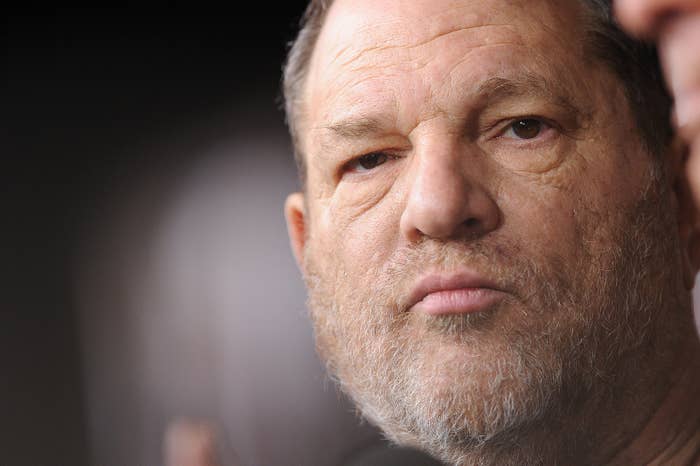
New York filed a civil rights lawsuit Sunday against not only Harvey Weinstein, but also his brother Robert and the Weinstein Company (TWC). The state's attorney general, Eric Schneiderman, announced he filed the lawsuit after conducting a four-month-long investigation that uncovered “egregious examples of sexual misconduct by Harvey Weinstein.”
The suit also alleges that TWC repeatedly broke New York state law by failing to protect its employees from Weinstein’s “unrelenting sexual harassment, intimidation, and discrimination." According to the attorney general’s office, the complaint was filed after investigators spent months interviewing “multiple survivors of Harvey Weinstein’s misconduct.”
The lawsuit reportedly will put a hold on the ongoing negotiations for the sale of TWC. TWC has not yet responded to BuzzFeed News' request for comment.
"The lawsuit in and of itself does not seek to block the sale,” Eric Soufer, spokesperson for the New York attorney general’s office. Soufer added that the terms of the deal did not disclose the existence of any victims compensation fund.
“We expressed to them how important it is that any deal adequately compensate victims, protect employees, and not reward those who enabled or perpetuated this egregious sexual misconduct,” said Schneiderman's press secretary, Amy Spitalnick, of the conversations with the potential buyers of TWC. “We were surprised to learn they were not serious about discussing any of those issues or even sharing the most basic information about how they planned to address them.”
Among the things Schneiderman's office reportedly uncovered is that Weinstein employed three groups of female employees to arrange, secure, coordinate, and perpetuate Weinstein’s sexual conquests.
According to the complaint, the primary job of one group of female employees at TWC was merely to accompany Weinstein to events and to facilitate his sexual conquests. A second group of female employees at TWC was tasked with contacting Weinstein’s sexual partners and ensuring there was space on his calendar for sexual activity, while a third group would follow up with prospective sexual conquests regarding Weinstein’s employment promises.
In addition, investigators also said they discovered that Weinstein threatened to kill employees and their family members, and made quid pro quo offers or demands of sexual favors in exchange for career advancement. There was even a “bible” at TWC that assistants could consult that detailed Weinstein’s preferences on many intimate matters. Weinstein’s drivers in both New York City and Los Angeles were required to keep condoms and erectile dysfunction injections in the car at all times, according to the New York attorney general’s complaint.
One employee was even reportedly flown from London to New York to teach Weinstein’s other assistants how to dress and smell more attractive to their boss, according to the complaint. Investigators said they also discovered that Weinstein had reportedly accosted one female employee while he was naked except for a bathrobe. Despite the fact that the employee reported the incident in 2015 to the human resources and to board members at TWC, no formal action was taken to investigate and to protect employees from further misconduct.
The attorney general's office said they also discovered that human resources at TWC was not empowered to take any action against Weinstein, and on one occasion one employee saw her complaint to HR directly forwarded to Weinstein.
The civil lawsuit also claims that not only were the board and the company well aware of Weinstein's sexual predatory practices, but they also included an unusual provision in his contract that effectively monetized, rather than prohibited, ongoing acts of sexual harassment and misconduct, according to the complaint. Weinstein's contract outlined that if he violated TWC's "Code of Conduct," he would face escalating financial penalties: $250,000 for the first instance, “$500,000, for the second such instance, $750,000 for the third such instance, and $1,000,000 for each such additional instance.”
The civil rights complaint alleges that if not for these failings of corporate management and oversight allowed Weinstein to continue to engage in persistent and unlawful conduct with impunity.
Ben Brafman, an attorney for Harvey Weinstein, said in a statement to BuzzFeed News that the former filmmaker believes Schneiderman's investigation "will demonstrate that many of the allegations against Harvey Weinstein are without merit."
"While Mr. Weinstein's behavior was not without fault, there certainly was no criminality, and at the end of the inquiry it will be clear that Harvey Weinstein promoted more women to key executive positions than any other industry leader and there was zero discrimination at either Miramax or TWC," the statement said. "If the purpose of the inquiry is to encourage reform throughout the film industry, Mr. Weinstein will embrace the investigation. If the purpose however is to scapegoat Mr. Weinstein, he will vigorously defend himself."
